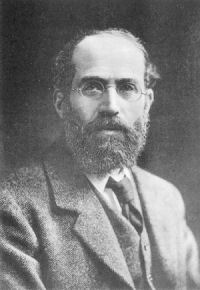Contribution of Sir Arthur Schuster

Extract from the obituary of Sir Arthur Schuster (1851-1934) by G. C. Simpson. Originally published in "Obituary Notices of Fellows of the Royal Society, Vol. 1, No. 4 (Dec., 1935), pp. 409-423".
It is a remarkable fact that Schuster never made any original contributions to the science of meteorology, yet it was a subject in which he was deeply interested and to which he devoted a great deal of his time and administrative ability. To give a complete account of what Schuster has done for meteorology in this country would be to write not only a history of the Meteorological Office but also a history of meteorology in the British Universities. Sixty years ago, meteorology was not a specialized science; there were no meteorologists and so far as meteorology was studied it was merely a part of physics. As a physicist, therefore, Schuster was familiar with the meteorology of those days and no doubt the same natural bent which led him to undertake eclipse work and work on terrestrial magnetism led him also to be interested in the physics of the atmosphere. In any case he was interested in geophysics in all its branches, and in 1900 the Royal Society, which was then the governing body of the Meteorological Office, appointed him to the Meteorological Council. The organization of the Meteorological Office, with its ever-increasing demands for funds, was giving difficulty to the Royal Society, and in 1902 the Treasury appointed a Committee, presided over by Sir H. Maxwell, to consider the future management of the Office. Schuster gave evidence before the committee and when, in 1905, as the result of the enquiry, the Meteorological Council of the Royal Society was replaced by a Meteorological Committee under direct Treasury control, Schuster was one of the two representatives of the Royal Society allotted to the Committee—Sir George H. Darwin was the other. For thirty-two years Schuster served on the Meteorological Council and Committee, taking a leading part in its work and acting as Vice-Chairman after the Office was transferred to the Air Ministry in 1919. When with increasing age he had to relinquish one after another of his activities and to retire from the numerous committees on which he had served, it was his membership of the Meteorological Committee which he was the most reluctant to give up and he attended the meetings until it was physically impossible for him to continue to do so.
Schuster was responsible for introducing meteorology as a university subject in this country. In 1905 he founded a small department of meteorology as part of the Physics Department of the University of Manchester, and the writer of this notice was placed in charge and became the first lecturer in meteorology in any British University. During the first year’s work the new department reorganized the meteorological station in the Whitworth Park, Manchester, and established a kite and balloon station on the hills near Glossop in Derbyshire for the investigation of the upper atmosphere. The writer held this post only one year and then joined the staff of the Indian Meteorological Department, but the meteorological work at Manchester was continued for some years by J. E. Petavel until he was appointed Professor of Engineering at Manchester. Of even more importance for meteorology in this country was the Readership in Meteorology which Schuster established for six years at his own expense in the University of Cambridge; this readership was held from 1907 to 1910 by E. Gold and 1912 to 1915 by G. I. Taylor, both of whom have made valuable contributions to the progress of meteorological science.